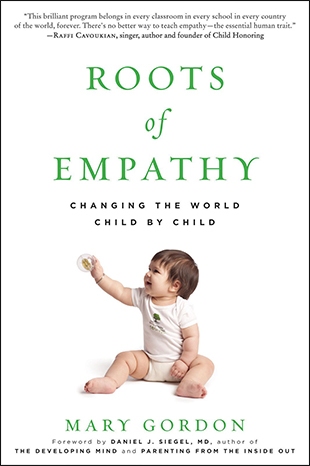"Imagine the Roots of Empathy effect in a global context. Imagine what it would mean if the attunement that informs the loving, learning relationship between parent and baby were translated into all human relationships, if each person's expressions of emotion and need were met by caring, empathic responses. We know that ideally a child is loved into being a loving person at home. When school becomes the next significant influence, we need a school culture that fosters social trust and respect. And if children were not loved into being loving at home, can they learn to be caring at school? Yes, they can and, when we consider the implications for health, well-being, and competence over their life span, they must be. Providing them with this opportunity is the only responsible thing to do.
"As a society we have an obligation to ensure that when parents, for whatever reason, are unable to provide a model of warm, responsive parenting, this deficit does not become the destiny of their children. It is not useful to blame and shame adults for deficits in parenting that they inherited. It is constructive to help parents to take responsibility in their parenting by providing the supports that are required. We have an obligation to halt the cycle, to give every child an alternative, and to open the door to caring and trust for them, so that when they become parents they will not be doomed to pass on to their children the harsh beginning they experienced themselves. We also seek to develop the sense of social justice that will encourage them as adults, whether or not they become parents themselves, to build a society that is a model of interdependence and inclusion.
"Imagine a generation of children across the world entering into adulthood and parenthood armed with self-esteem, a reciprocity of understanding of emotions, a sense of community, a commitment to peaceful resolution of conflict, a valuing of social inclusion. Imagine the world this would call into being:
"• Every child raised on a banquet of love in a society where their parents are not penalized in terms of income, opportunity, or self-development for the act of becoming a parent.
• Every school a center of collaborative learning that trains the heart as well as the mind, where character and intelligence are equally valued and nourished, where we celebrate helpfulness, cooperation, and kindness as well as good math scores.
• Every community a place of human connection, where social trust exists, where no one is left to struggle in poverty or neglect or isolation.
• Every nation a peaceful member of an interdependent global family, where the valuing of human life and the protection of our environment are the yardsticks by which all decisions are measured.
"These are not new values or ideals. As long as there has been strife and hunger and exploitation and cruelty, there have been visionaries, humanitarians, and people of goodwill who have advocated another life-affirming way. What is new is that we no longer have an excuse to go on inflicting pain and dividing up the earth's resources as if the world were still a collectivity of medieval fiefdoms separated from one another by impassable mountain ranges and unknown seas. We know too much. At the touch of a button, we can see children dying from disease and famine, while we know that the medicine and food that would save them exists. At the touch of a button we can see the victims of war and poverty, with hopelessness and suffering, while political leaders feed us what we know is diversionary rhetoric about balancing budgets and balancing power. At the touch of a button we can visit the devastation of a country five thousand miles away or the mean streets of our own troubled cities, where children are hounded by bullies. Where, in all the gadgetry of our lives, is the 'empathy button'? Where is the on switch of human responsibility that would let us feel the emotion behind what we know and impel us to stand up and take action for what we believe in?
"We know that the ability to express emotion, the ability to understand another's point of view, and the ability to respond empathically to the expressed emotions of others is the currency of relationship-building. We know that these skills are learned and that empathy can be developed. Even though the ideal environment for this learning is the early years, we know that it is not too late to open doors to emotional literacy and empathy in the school years. We know that even for children who have a solid start in life, nourishing emotional literacy and empathy through the school years strengthens social competence and altruistic behaviors."
